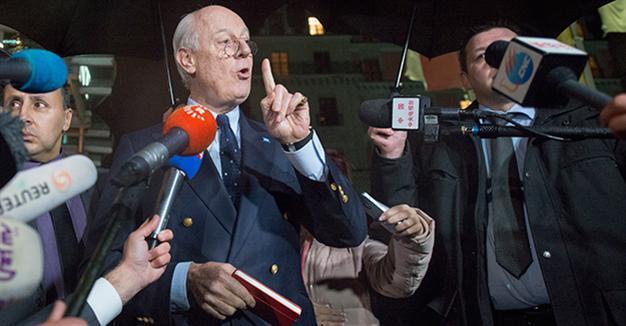West blames Russia for ‘pause’ in Syria peace talks
GENEVA

Staffan de Mistura, UN Special Envoy of the Secretary-General for Syria, speaks to the press in Geneva, Switzerland, Wednesday, Feb. 3, 2016. U.N. Special Envoy for Syria Staffan de Mistura announced Wednesday there would be a "temporary pause" in the indirect peace talks between the government and opposition, saying the process will resume Feb. 25. AP Photo
Western countries have blamed Russian airstrikes in favor of Syrian President Bashar al-Assad’s regime forces for a halt to United Nations-brokered Syria peace talks in Geneva.The United States demanded Feb. 4 that Russia immediately halt its bombing campaign in Syria after a bitter breakdown in peace talks exposed the deep rift between world powers aiming to end the five-year conflict.
International donors met in London on the Syria crisis just hours after the peace talks in Geneva were suspended on Feb. 3 until Feb. 25, with U.N. Special Envoy for Syria Staffan de Mistura saying “more work” was needed.
American Secretary of State John Kerry warned Moscow to halt its bombing of the Syrian opposition in what he said was a “robust” phone call with his Russian counterpart, Sergei Lavrov, according to Agence France-Presse.
“We discussed, and we agreed, that we need to discuss how to implement the cease-fire,” he said, adding that he and Lavrov would speak again later in the day or on Feb. 5.
The Russian Foreign Ministry said Kerry and Lavrov had agreed to do everything possible to make the break in peace talks “as short as possible.”
French Foreign Minister Laurent Fabius accused Syria and Russia of “torpedoing the peace efforts” with an offensive.
On the ground, nearly 40,000 people have fled an offensive this week by al-Assad’s regime north of the city of Aleppo, according to the Syrian Observatory for Human Rights monitor.
Al-Assad’s forces also entered two Shiite villages that were under siege by rebels, prompting what state news agency SANA called “mass celebrations” in the streets of Nubol and Zahraa, located in the northwestern Aleppo governorate.
U.N. Secretary-General Ban Ki-moon said Feb. 4 the pause in the talks showed “just how deep, how difficult the divisions are.”
Turkish Prime Minister Ahmet Davutoğlu said the reason the Geneva talks were paused was the continuation of bombardments against civilians, schools and hospitals in Latakia and elsewhere in Syria.
“There are two enemies of humanity today: the [Syrian President Bashar] al-Assad regime and the Daesh terror,” said Davutoğlu, using an acronym for the Islamic State of Iraq and the Levant (ISIL), according to state-run Anadolu Agency. “Those who are helping the al-Assad regime are committing the same war crimes,” he said.
Davutoğlu also called for the U.S. to take a more decisive stance against Russia over its intervention in Syria.
The Geneva initiative aimed to coax both sides into six months of indirect “proximity talks” under a November 2015 roadmap, but there were problems from the start.
The opposition High Negotiations Committee (HNC) arrived reluctantly and several days late, insisting on immediate steps to allow aid to get through to besieged cities, a halt to the bombardment of civilians and the release of thousands of prisoners.
The head of the Syrian government’s delegation Bashar Ja’afari on Feb. 3 accused the Saudi-backed opposition of wanting to withdraw from peace talks under pressure from regional powers, namely Saudi Arabia, Qatar and Turkey, and the United Nations of suspending the talks until Feb. 25 to avoid such a walk-out.
“We knew few hours ago the Riyadh [opposition] wanted to withdraw from the talks and that’s why Mr. de Mistura’s announcement came as a political coverage of the decision to withdraw,” Ja’afari said.
“We consider that the style used by the special envoy to justify the withdrawal of the Riyadh delegation under instructions from Saudi Arabia, Qatar and Turkey to not be subjective. It didn’t say the truth as it was,” he said, speaking before going into talks with de Mistura.
Meanwhile, the Britain-based Syrian Observatory for Human Rights said at least 21 civilians, including three children, were killed Feb. 4 in Russian strikes on rebel-held districts of Aleppo.
The observatory said the strikes on six neighborhoods of the northern city had also wounded many, and that the toll could rise.
Observatory director Rami Abdel Rahman said it was the first time his organization had been able to confirm Russian air strikes on the city of Aleppo since Moscow began its intervention on Sept. 30, 2015.
Until now, Russian strikes had been concentrated on Aleppo province, he said.
















